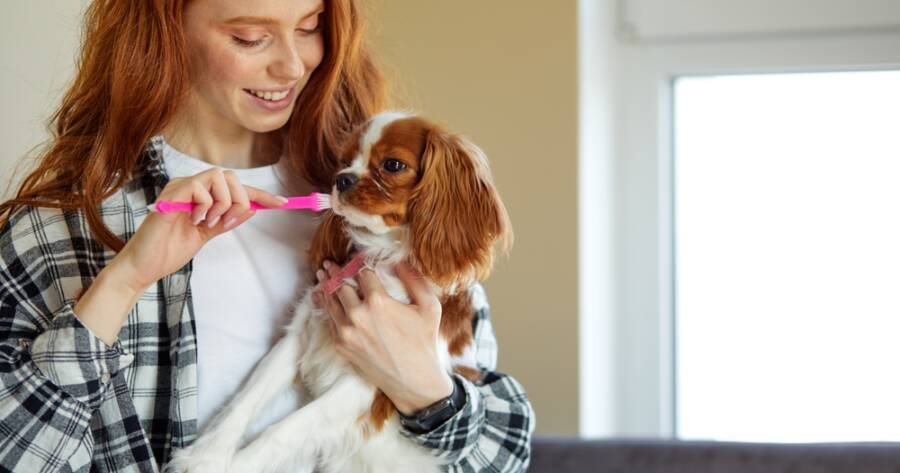Your dog’s smile is more than just adorable, it’s a key indicator of their overall health. But dental care doesn’t always require a vet visit or a professional cleaning. With the right tools and habits at home, you can help prevent plaque, tartar, and painful dental issues. Daily attention to your dog’s teeth not only freshens their breath but also supports long-term health, saving you stress, money, and unnecessary trips to the vet.
Start Brushing Early to Build the Habit
The sooner you introduce toothbrushing, the better. Starting when your dog is a puppy helps normalize the routine and reduces resistance as they age. Use a dog-specific toothbrush and toothpaste, never human toothpaste, as it contains ingredients that can be harmful to dogs. Start slowly by letting them taste the toothpaste and gently rubbing their teeth with your finger before moving on to the brush.
For adult dogs who are new to brushing, be patient and consistent. Brushing just a few times per week can significantly reduce plaque buildup and freshen breath. Gradually increase the frequency, and always reward your dog with praise or a small treat afterward. Making the experience positive helps reinforce good dental hygiene as part of your dog’s regular care.
Dental Chews and Treats That Actually Work
Dental chews are a convenient and tasty way to support your dog’s oral health. These treats are specially designed to help reduce tartar and plaque through chewing action and ingredients that promote a cleaner mouth. Look for chews approved by the Veterinary Oral Health Council (VOHC) to ensure they’re effective and safe.
While not a replacement for brushing, dental chews can be a great supplement, especially for dogs who resist having their teeth brushed. Giving your dog a daily dental chew can also help with bad breath and provide mental stimulation. Be sure to follow the package recommendations and monitor for any digestive issues, especially if introducing them for the first time.
Consider Mouth Sprays and Water Additives
If your dog won’t tolerate brushing or you’re looking to enhance their dental routine, oral sprays and water additives can help. These products are formulated to reduce bacteria and freshen breath. Simply spray directly into your dog’s mouth or add the product to their water bowl for daily use.
Many water additives are tasteless and easy to incorporate into your pet’s routine. While they’re not a substitute for brushing, they can help maintain oral hygiene between more thorough cleanings. Always choose veterinary-recommended products, and introduce them gradually to ensure your dog accepts the new routine without stress.
How Often Should You Clean Your Dog’s Teeth?
Ideally, you should brush your dog’s teeth every day, just like you do your own. But if that’s not realistic, even brushing three times a week can make a noticeable difference in dental health. Combine brushing with daily dental treats or water additives for the best results.
Pay attention to your dog’s breath, eating habits, and the appearance of their gums and teeth. If you notice tartar buildup, inflamed gums, or a sudden change in appetite, it may be time to step up your at-home care or schedule a professional cleaning. Consistency is key—routine care helps prevent expensive vet visits down the line.
Watch for Signs Professional Care Is Needed
Even with diligent at-home care, your dog may eventually need a professional dental cleaning. Signs include persistent bad breath, red or bleeding gums, excessive drooling, difficulty eating, or visible tartar buildup. These symptoms can indicate dental disease, which requires treatment by a veterinarian.
Professional cleanings involve anesthesia and allow the vet to remove tartar below the gum line, something at-home tools can’t reach. It’s also a chance to check for more serious issues like broken teeth or infections. Regular at-home care can reduce the frequency of professional cleanings, but don’t ignore signs that a vet visit is necessary.
Make Dental Care a Positive Routine
Consistency and a calm approach go a long way in keeping your dog’s teeth clean. Try to incorporate dental care into a relaxing part of the day, after a walk or before bedtime, for example. Use gentle movements, soothing tones, and reward-based training to help your dog associate tooth care with positive attention.
If your dog resists, back off and try again the next day. The goal is progress, not perfection. As your dog becomes more comfortable, dental care becomes less of a chore and more of a bonding activity. Like all good habits, it gets easier over time with love and patience.
A Healthier Smile Starts at Home
Keeping your dog’s teeth clean doesn’t have to be complicated; it just requires consistency, the right tools, and a little daily effort. With regular brushing, smart dental treats, and helpful products like sprays or water additives, you can support your pup’s oral health and overall well-being. Watch for changes that signal a need for professional care, but don’t underestimate the power of daily oral care!

